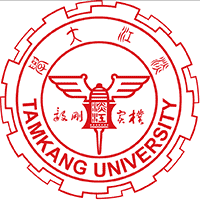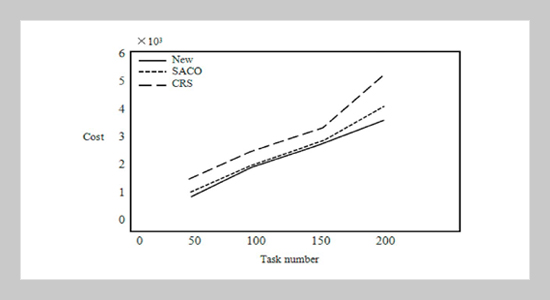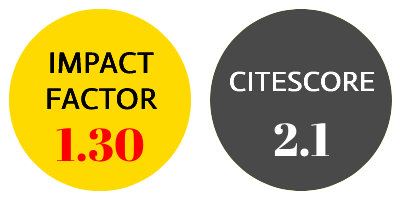1College of Electronic Information and Electrical Engineering, Dalian University of Technology, Dalian, P.C 116000, P.R. China
Received:
March 25, 2019
Accepted:
August 9, 2019
Publication Date:
December 1, 2019
Download Citation:
||https://doi.org/10.6180/jase.201912_22(4).0003
ABSTRACT
Resource allocation acts an important role in cloud computing. Traditional resource allocation methods have time-consuming, expensive and low efficiency disadvantages. Therefore, we propose an improved krill herd algorithm for resource allocation in cloud computing. Firstly, the status of cloud computing resource allocation is analyzed. Then, in order to prevent krill herd falling into local solution, we introduce random perturbation factor to improve the induction movement and foraging movement of krill herd. Finally, the experiments results show that the proposed method can effectively improve the system resource utilization, the allocation performance is better than other cloud computing resource allocation methods.
Keywords:
Cloud Computing, Resource Allocation, Krill Herd Algorithm, Random Perturbation
REFERENCES
- [1] Yang, C., L. Li, S. You, et al. (2017) Cloud computing-based energy optimization control framework for plug-in hybrid electric bus, Energy 125(5), 11_26. doi:10.1016/j.energy.2017.02.102
- [2] Zhang, Q. C., M. Lin, Laurence T. Yang, Z. K. Chen, Samee U. Khan, and P. Li (2018) A double deep Q learning model for energy-efficient edge allocation, IEEE Transactions on Services Computing. doi: 10.1109/TSC.2018.2867482
- [3] Li, P., Z. K. Chen, Laurence T. Yang, Q. C. Zhang, and M. Jamal Deen (2018) Deep convolutional computation model for feature learning on big data in internet of things, IEEE Transactions on Industrial Informatics14(2), 790_798. doi: 10.1109/tii.2017.2739340
- [4] Shila, D. M., W. Shen, Y. Cheng, et al. (2017) AM Cloud: toward a secure autonomic mobile Ad Hoc cloud computing system, IEEE Wireless Communications24(2), 74_81. doi: 10.1109/MWC.2016.1500119RP
- [5] Zhang, Q. C., Laurence T. Yang, Z. K. Chen, P. Li, and F. Y. Bu (2018) An adaptive dropout deep computation model for industrial IoT big data learning with crowd sourcing to cloud computing, IEEE Transactions on Industrial Informatics. doi: 10.1109/TII.2018.2791424
- [6] Liu, X., X. Zhang, W. Li, et al. (2017) Swarm optimization algorithms applied to multi-resource fair allocation in heterogeneous cloud computing systems, Computing99(12), 1231_1255. doi: 10.1007/s00607-017-0561-x
- [7] Zhang, Q. C., Laurence T. Yang, Z. Yan, Z. K. Chen, and P. Li (2018) An efficient deep learning model to predict cloud workload for industry informatics, IEEE Transactions on Industrial Informatics 14(7), 3170_3178. doi: 10.1109/TII.2018.2808910
- [8] Lin, T., H. Li, and S. L. Yin (2018) Modified pyramid dual tree direction filter-based image de-noising via curvature scale and non-local mean multi-grade remnant multi-grade remnant filter, International Journal of Communication Systems 31(16). doi: 10.1002/dac.3486
- [9] Lin, T., and H. Li (2019) CSDK: a chi-square distribution-kernel method for image de-noising under the IoT big data environment, International Journal of Distributed Sensor Networks 15(5). doi: 10.1177/1550147719847133
- [10] Cui, Y. F., X. M. Li, K. W. Dong, et al. (2011) Cloud computing resource allocation method research based on improved genetic algorithm, Advanced Materials Research 271_273, 552_557.
- [11] Li, P., Z. K. Chen, Laurence T. Yang, J. Gao, Q. C. Zhang, Jamal Deen (2018) An incremental deep convolutional computation model for feature learning on industrial big data, IEEE Transactions on Industrial Informatics. doi: 10.1109/TII.2018.2871084
- [12] Feng, Y. E. (2014) Application of two-way convergence ant colony algorithm in QoS of cloud computing resource allocation, Electronics Optics & Control 11, 93_96. doi: 10.3969/j.issn.1671-637X.2014.11.019
- [13] Cao, Z., J. Lin, C. Wan, et al. (2017) Optimal cloud computing resource allocation for demand side management in smart grid, IEEE Transactions on SmartGrid 8(4), 1943_1955. doi: 10.1109/TSG.2015.2512712
- [14] Samimi, P., Y. Teimouri, and M. Mukhtar (2016) A combinatorial double auction resource allocation model in cloud computing, Information Sciences 357,201_216. doi: 10.1016/j.ins.2014.02.008
- [15] Liu, Y., M. Lee, and Y. Zheng (2016) Adaptive multi resource allocation for cloudlet-based mobile cloud computing system, IEEE Transactions on Mobile Computing15(10), 2398_2410. doi: 10.1109/TMC.2015.2504091
- [16] Wang, Y., S. Meng, Y. Chen, et al. (2017) Multi-leader multi-follower Stackelberg game based dynamic resource allocation for mobile cloud computing environment, Wireless Personal Communications 93(2), 1_20.doi: 10.1007/s11277-016-3351-4
- [17] Yin, S. L., L. Jie, and T. Lin (2018) Anew krill herd algorithm based on SVM method for road feature extraction, Journal of Information Hiding and Multimedia Signal Processing 9(4), 997_1005.
- [18] Lin, T., H. Li, S. L. Yin, and Y. Sun (2019) Improved krill group-based region growing algorithm for imagese gmentation, International Journal of Image and Data Fusion. doi: 10.1080/19479832.2019.1604574
- [19] Prasad, S., and D. M. V. Kumar (2017) Optimal allocation of measurement devices for distribution state estimation using multi objective hybrid PSO _ Krill Herd algorithm, IEEE Transactions on Instrumentation &Measurement 66(8), 2022_2035. doi: 10.1109/TIM.2017.2674718
- [20] Chrouta, J., A. Zaafouri and M. Jemli (2017) Engineering optimisation by heterogeneous cuckoo search algorithm: application to an irrigation station, International Conference on Advanced Systems & Electric Technologies, IEEE. doi: 10.1109/ASET.2017.7983706
- [21] Li, C., L. Zhu, Y. Liu, et al. (2017) Resource scheduling approach for multimedia cloud content management, Journal of Supercomputing 73(2), 1_23. doi:10.1007/s11227-017-2074-y
- [22] Zhang, Z., F. Hu, and N. Zhang (2018) Ant colony algorithm for satellite control resource scheduling problem, Applied Intelligence 1_11. doi: 10.1007/s10489-018-1144-z
















